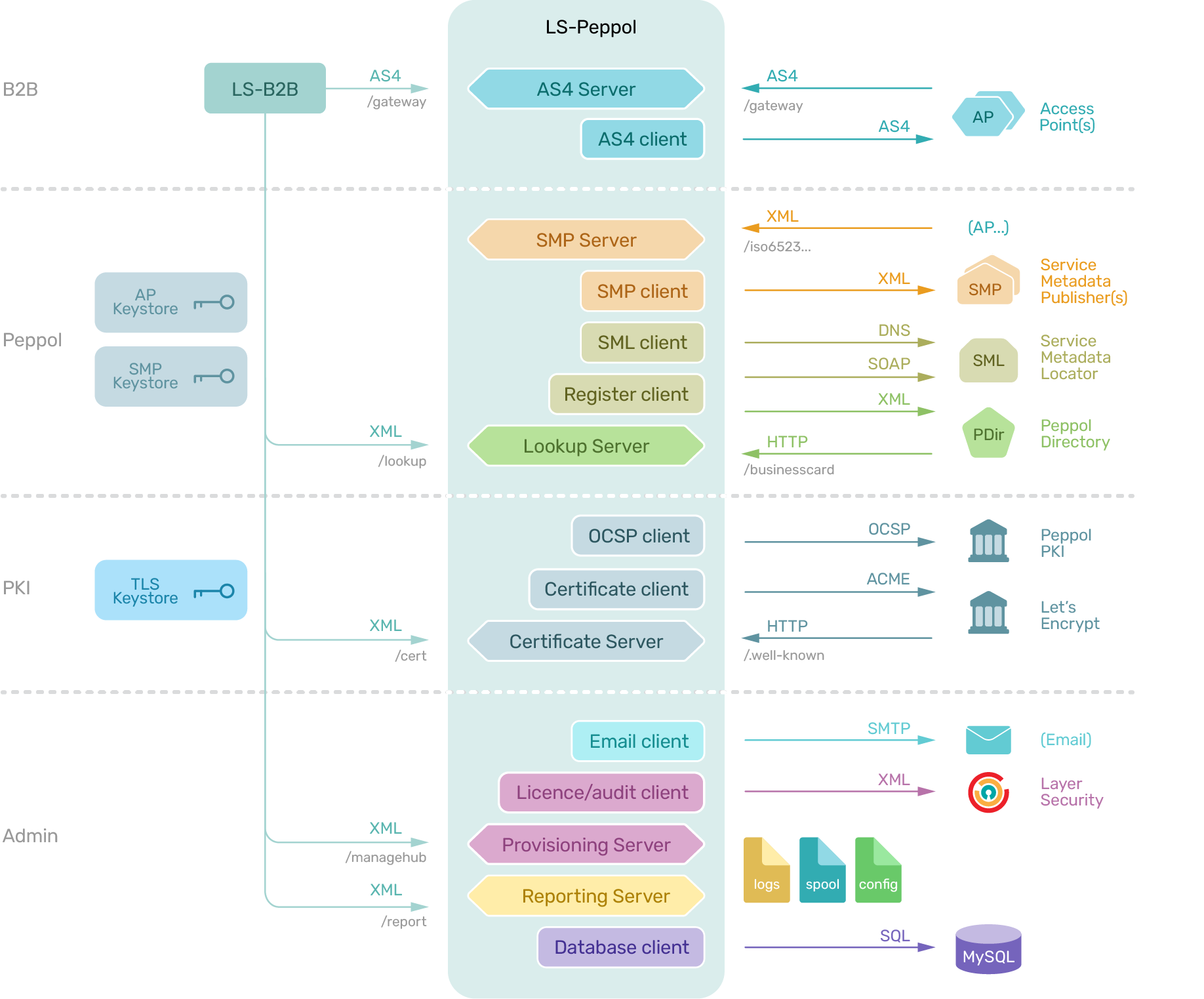LS-Peppol Specifications
LS-Peppol is a small, fast, efficient, and feature-rich ebMS3/AS4 server designed for business software applications needing an easy way to directly send and receive documents on the Peppol network.
Overview
It has been custom-built to be easy to install, manage and run, so that you can be your own certified Peppol Service Provider, and effortlessly exchange documents on the Peppol network.
Packed inside a tiny (6 MB) executable, LS-Peppol provides a powerful, all-in-one Peppol server which seamlessly integrates both an ebMS3/AS4 Access Point (AP) and a Service Metadata Publisher (SMP).
Applications can easily send/receive Peppol documents and manage the LS-Peppol server using the simple-to-use companion LS-Peppol client (LS-B2B).
LS-Peppol has many advanced features including strong security, server management, certificate provisioning, recipient discovery, multi-level authorisation, statistics, and conformance to all the Peppol and related international standards.
Architecture
All aspects of the Peppol eDelivery are supported, including:
Messaging - AS4 (push, pull), lookups (SMP, SML), provisioning (SMP, SML, Peppol Directory), etc.
Operations - logging, notifications, security, certificate renewal, etc.
Management - reporting, statistics, provisioning, auditing, etc.
Notably, LS-Peppol seamlessly integrates all required servers and clients into a single executable:
6 inbuilt servers – gateway, SMP, lookup, certificate, provisioning, and reporting.
10 inbuilt clients – AS4, SML, SMP, register, credentials, OCSP, licence, audit, email, and database.

Features
Product
Fast, secure, ebMS3/AS4 messaging server
Easy to configure, monitor and manage
Database for authorisation, statistics, and reporting
Standards compliant including Peppol.
Access Point (AP)
Full featured Peppol Access Point (AP)
AS4 signing and payload encryption
Integrated SML client (for dynamic discovery of recipients)
Integrated SMP client (including Peppol wildcard matching)
Service Metadata Provider (SMP)
Integrated Peppol SMP server
Automated synchronisation with SML and Peppol Directory
Automated sender registration (optional)
Support for PINT wildcards and multiple locators.
Standards
Peppol AS4 (2.0.3) and Peppol Transport Security (1.1.0)
Peppol SMP (1.4.0) and Peppol Identifiers (4.4.0)
Peppol SML (1.3.0) and Peppol Directory (1.1.1)
Peppol Statistics Reporting (Transaction 1.0.2, End User 1.1.1)
Peppol Message Level Status (MLS 1.0.0, SPIS 1.0.0)
Peppol Code Lists (9.4) and Peppol SBDH (2.0.1)
Peppol PINT and wildcard scheme
(and all other current Peppol eDelivery standards)
Security
Message signing (e.g. AS4 receipts, SMP responses)
Digital signature checking including certificate chain verification
Certificate revocation checking (OCSP)
Delegated administration with strong authentication and authorisation
TLS on all connections (v1.2/v1.3 with TLS SNI extension).
Management
Automated server credential provisioning and renewal
Automated client certificate issuance
Support for manager (credentialed) and hub (managed) parties
Database for authorisation, statistics, and reporting
Notifications of alarms and alerts to an email address
Comprehensive documentation.
Operations
Simple XML configuration file
Easy to install – requires no special privileges or OS packages (other than the database)
Fast and efficient - with exceptionally low memory and CPU requirements
Minimal footprint - just consisting of an executable and environment files (e.g. configuration, keystores, logs)
Ability to listen on multiple ports and auto-detect TLS
Flexible tracing and logging - with options for log retention, log file compression, and using Syslog.
Specifications
Size
6 MB (GZIP)
6 MB
20 MB (plus space for spool area and log files)
Performance
< 1 second
Near wire speed (mostly limited by remote server)
< 1% average load on any modern computer
System Requirements
Any modern server system (VM or container)
LS-Peppol - Linux glibc 2.28 or later (64-bit)
LS-B2B - Windows 10 or later (32-bit or 64-bit)
LS-B2B - Linux glibc 2.28 or later (64-bit)
LS-Peppol - MariaDB-Server
Protocols and Security
HTTP (1.1), HTTPS, TLS (1.2, 1.3), TLS Extensions (SNI), Mutual TLS (MTLS), Proxy, UDP, DNS, REST, AS4 (ebMS3), SOAP, WS-Security, ACME (Let’s Encrypt), OCSP, SMP (Oasis), BDXL (Oasis)
XML, SBDH, MIME, JSON, X.509 (certificates), PKCS#7 (CMS, certificates), PKCS#8 (private key), PKCS#10 (CSR), JWS (signatures), JWK (keys)
RSA, ECC (public key), AES (symmetric key), SHA-2 (hash family), PKCS#1 (signing), LZW (GZip)
PEM (TLS, AP, SMP)
Open-Source Components (embedded)
V3.6.0 - licensed under OpenSSL License
V1.3.1 - licensed under Zlib License
V3.4.8 - licensed under LGPL

